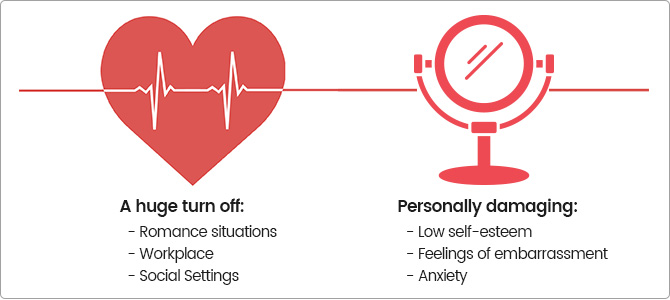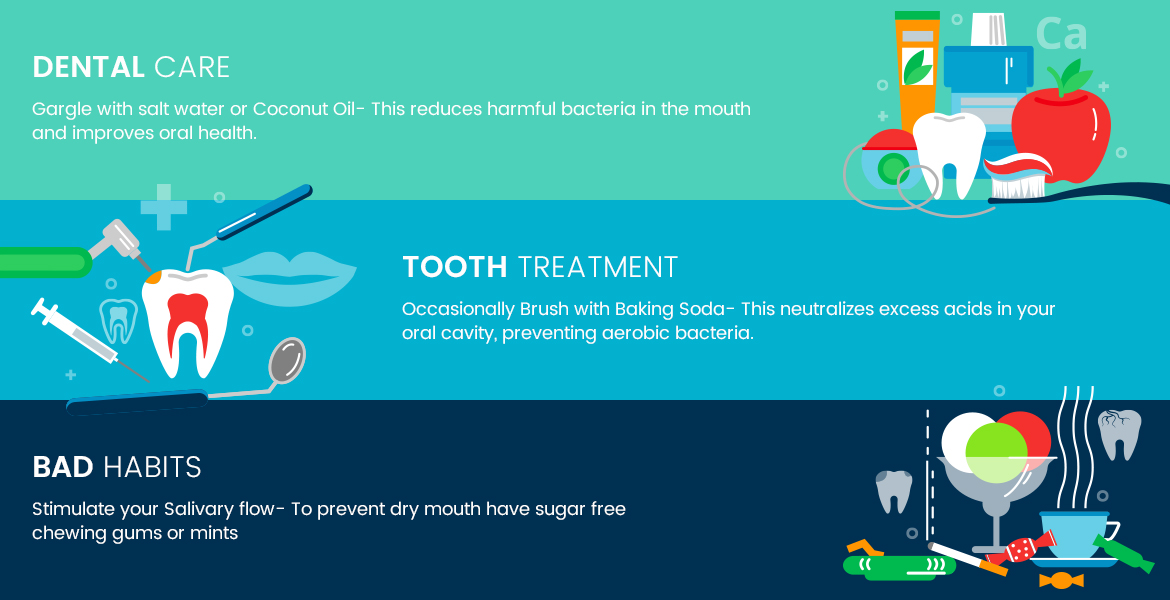What Bad Breath Means?
If you wake up with bad breath in the morning that goes away when you brush, you don't really have a problem. But many people experience having a dry mouth accompanied by bad odour all day long. This could be due to Halitosis, more commonly known as bad breath. This unpleasant odour of the mouth can occur on occasions, or can be a chronic daily condition. As our mouth is home to hundreds of different kinds of bacteria, some of those can cause odours. The breath odour may affect everyone at some point mainly due to the foods you eat, poor oral hygiene, medical conditions, or several other factors. Fortunately, bad breath can finally be a thing of the past, with natural remedies and products now available at an affordable price.
Does Bad Breath Affect Your Life?
Oral hygiene problems, especially involving odour, have always been an embarrassing or anxious subject. Whilst bad breath odour isn’t life threatening it can be very prominent on the sufferer’s mind and can have a big mental effect on the individual. Unfortunately, it’s often the case that it's the sufferer who’s the last person to realise that there’s a problem with their oral hygiene. Luckily there are a range of natural products available on the market to help fight the battle against bad breath odours.
Signs Or Symptoms You Have Bad Breath
The first, and probably most obvious sign, should be the reaction of people around you. If you see friends, colleagues or family offering you gum or a mint, looking away from you while you speak or maintain a distance, you might be suffering from bad breath. If you observe a yellowish coating on your tongue that doesn’t disappear completely after tongue scraping then it can build up mouth odour. Thick saliva and dry mouth are also signs that you may have bad breath.
If you’re battling with a bad odour in your mouth, you may also notice a bad taste. This could be due to any trapped food particles; it may disappear if you brush your teeth and use mouthwash, but if the bad taste and odour in your mouth is due to an underlying condition such as Halitosis, you should visit your family doctor to rule out this underlying condition without any delay.
What Are The Causes Of Bad Breath?
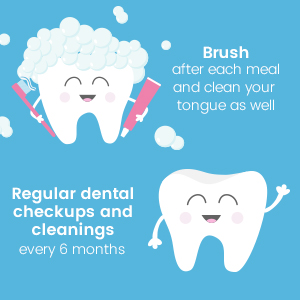
Poor Oral Hygiene
If you neglect brushing your teeth and flossing, the combination of the bacteria and trapped food in your mouth will produce an unpleasant odour. Brushing and flossing regularly is the easiest way to remove this trapped food before it decays and makes things worse. Brushing also removes plaque, a sticky substance that builds up on your teeth, yet another reason of odour. If you’re a denture user, not cleaning them regularly can also be a major cause of bad breath odour as again, bacteria takes set in the dentures and can cause the embarrassing odours.

Periodontal Disease
Plaque build-up due to poor oral hygiene does not just cause cavities but can also cause periodontal disease. This disease happens when you don’t remove plaque over time. As time passes, this plaque hardens into tartar which is very difficult to remove from enamel by mere brushing. Tartar can even irritate your gums and may cause pockets, or small openings or gaps, to form in the area between the teeth and gums. Your food, bacteria, and dental plaque can get stuck in these pockets created by periodontal disease, causing a strong odour. A diet rich in fibre, fruits, and vegetables along with maintaining good oral hygiene will help prevent periodontal disease.
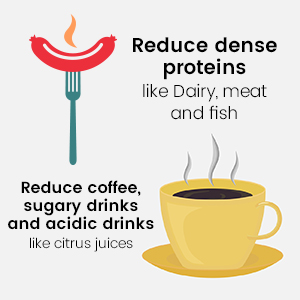
Strong Foods and Beverages
During digestion, the stomach absorbs oils from the foods during the process. Dishes with a strong flavour, such as onions and garlic for example, enter the bloodstream and make their way up to the lungs and an odour is excreted for up to 72 hours. Using natural remedies such as chewing on mint won’t have too much effect on the problem as it’s from the lungs at this stage, however drinking strong flavoured or aromatic beverages such as coffee will help the odour issue.

Smoking
If you have a habit of smoking cigarettes or cigars, this could be the reason for the bad odour. Smoking dries your mouth up and can make the current odour even worse.
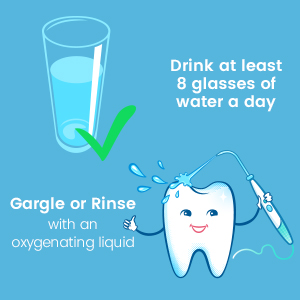
Dry Mouth
Your mouth can dry out when you aren't able to create enough saliva. Saliva can help to reduce the odour and keep the mouth clean. Issues that affect a dry mouth are salivary gland conditions, certain medications, including those that treat high blood pressure and urinary conditions, and the most common, sleeping with your mouth open.
What Can I Do To Avoid Bad Breath?
Looking at what causes bad breath odour above, you can easily implement some simple actions to help stop bad breath.
Although there's still no alternative to brushing your teeth and using a tongue scraper 2 or more times every day, you can even floss daily and/or add an antimicrobial mouthwash to your daily oral hygiene regime to kill bacteria. For long-term benefits, you should add natural remedies or solutions for bad breath in your daily oral hygiene routine. Below are some simple actions that can be implemented quickly that can help with Halitosis:
- Staying hydrated
- Quitting smoking
- Scheduling dental examination every 6 months
- Cleaning your dentures, mouth guards and retainers daily
- Replacing your old toothbrush with a new one every 3 months
- Taking care of overall oral hygiene
If the bad odour is caused due to a plaque build-up, you may need a dental appointment to solve the problem. A deep dental cleanse may be necessary if you have developed periodontal disease. Sometimes even treating underlying medical problems, such as a sinus infection or kidney disease, may help improve breath odour. But if there's no big reason behind your bad breath, there are easy ways to get rid of it without going to the doctor such as chewing gum all day or even eating a continuous intake of tic tacs or natural mouth fresheners!
How To Get Rid Of Bad Breath At Home?

This can be distressing, but it’s not life-threatening as bad breath is rarely complicated due to a medical disorder that needs to be treated. Most of the time, good oral hygiene can help to cure and prevent your mouth odour. As part of your daily oral hygiene routine, you should:
- floss between your teeth
- brush your teeth and gums
- clean your tongue
You can even consider investing in an electric toothbrush, which can make cleaning easier, fun and more effective. Even if good oral hygiene does not help you to get rid of bad breath, see a dentist or doctor for a diagnosis if bad breath is accompanied by symptoms like:
- pain or difficulty while chewing or swallowing
- broken teeth or tooth ache
- white spots on the tonsils
- persistent dry mouth
- sores in the mouth
- fever
Note: If you have developed bad breath after taking a new medication or after recent dental surgery, see a doctor or dentist to get the right treatment.
Are There Natural Remedies For Bad Breath?
A balanced diet (free of strongly-flavoured foods, reduced sugar and alcohol intake), plenty of water and quitting smoking can all have a rapid, positive impact in many cases acting as home remedies for bad breath. Other options include:
Herbs: Natural Remedies For Bad Breath
Adding some refreshing elements in your diet could help neutralise bad breath. One way you can do this is by drinking nettle tea. This is a powerful herb that has shown its ability to purify the blood and eliminate toxins from the body. Stinging nettles also help stimulate the lymphatic system, increase the excretion of uric acid through the kidneys, and boost adrenal function, all that is needed to target halitosis from its root.
Besides nettle, herbs like alfalfa sprouts, parsley, peppermint, dill, fennel, sage, liquorice, dandelion goldenseal, Echinacea, wild yam, myrrh, lemon and chlorophyll tablets are also seen as viable treatment options for bad breath and oral hygiene. These natural remedies are effective for temporarily relieving bad breath and supporting oral hygiene.
Coconut Oil: A Natural Solution For Bad Breath
Coconut oil seems good for almost everything, including bad breath! Another old remedy to heal inflammation and get rid of bad breath odours that you might be familiar with is gargling salt water. Oil pulling is an ancient technique used to clean the mouth and teeth which mostly use coconut oil that is comparable to salt water gargling. Fill the mouth with the coconut oil and swish it around in your mouth like mouthwash for up to 20 minutes at a time.
Oil pulling can bring much needed relief to your toothaches and whiten your teeth. We have also heard people mention how good their mouth smells and feels after washing with coconut oil in the mornings, which can stay all day. You can also replace flossing with coconut oil pulling if you don’t wish to hurt your gums and yet maintain good oral hygiene.
The Final Word
There are a variety of methods that provide a bad breath cure but you should choose the treatment depending on the cause. Most of them work by simply helping you to improve your oral hygiene and lifestyle. Brushing your teeth and flossing regularly are top of the list, as is keeping your tongue clean and visiting your dentist every 6 months. These lifestyle alterations will help to ensure good oral hygiene.
In the modern day, there are many ways you can learn about how to stop bad breath and many places offer a wide range of innovative, effective and all natural products designed to rid you of this embarrassing and potentially anxious condition. But overall, to enjoy fresh breath and full confidence, make sure to follow a good oral hygiene regime!
